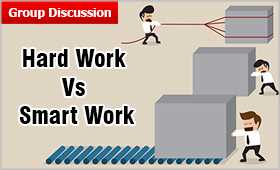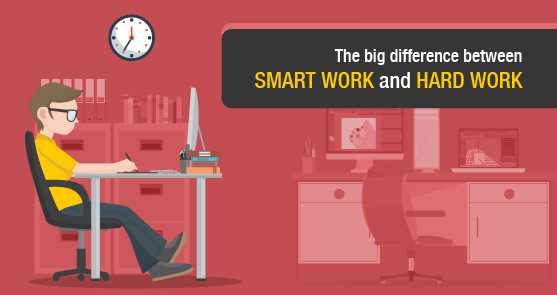When it comes to achieving success, there are two common approaches: working hard and working smart. Each approach has its advocates and its critics, but which one is truly more effective? This is a question that has been debated for years, and there is no definitive answer. However, by examining the strengths and weaknesses of each approach, we can gain a better understanding of how to achieve our goals.
Working hard is often seen as the traditional approach to achieving success. It involves putting in long hours and giving maximum effort to reach a desired outcome. Those who work hard believe in the power of perseverance and are willing to sacrifice their time and energy for success. They believe that hard work is the key to achieving their goals and are willing to do whatever it takes to get there.
On the other hand, working smart involves finding more efficient and effective ways to achieve success. It is about taking a strategic approach and focusing on tasks that will yield the greatest results. Those who work smart prioritize their time and energy, and they use innovative strategies to maximize their productivity. Instead of working long hours, they focus on working efficiently and effectively to achieve their goals.
In conclusion, both working hard and working smart have their merits and limitations. The key is to find a balance between the two approaches that works best for you. Some situations may call for more hard work, while others may require a smarter approach. Ultimately, the most effective approach will vary depending on the individual and the specific circumstances. By understanding the strengths and weaknesses of each approach, you can make more informed decisions and increase your chances of achieving success.
Benefits of Working Hard
Working hard has numerous benefits and can lead to both personal and professional growth. Here are some of the key advantages of putting in the effort and working hard:
-
Improved Skill Development: Working hard allows individuals to enhance their skills and acquire new ones. The more effort and time you invest in your work, the more opportunities you have to learn and improve. Through hard work, you can become more proficient in your field or develop new expertise that can open doors to exciting opportunities.
-
Increased Efficiency: Hard work often leads to increased efficiency and productivity. By dedicating yourself to your work and putting in the necessary effort, you can become more adept at finding ways to streamline processes and complete tasks more efficiently. This can lead to better results and allow you to accomplish more in less time.
-
Enhanced Reputation: The consistent hard work and dedication you put into your job can help you build a positive reputation. When others see your commitment and the quality of your work, they are more likely to trust and rely on you. This can lead to increased opportunities for promotions, raises, and career advancement.
-
Personal Satisfaction: Working hard and achieving success can bring a sense of personal satisfaction and fulfillment. When you see the results of your hard work and the progress you have made, it can boost your self-confidence and provide a sense of accomplishment. This can motivate you to continue working hard and pursuing your goals.
-
Long-Term Success: Hard work is often the key to long-term success. While there may be shortcuts or quick fixes available, true success is often built on a foundation of hard work and dedication. Those who are willing to put in the effort and persevere through challenges are more likely to achieve their goals and experience long-lasting success.
Overall, working hard has many benefits that can contribute to personal growth, professional success, and a sense of fulfillment. It allows individuals to continuously improve their skills, increase efficiency, build a positive reputation, experience personal satisfaction, and ultimately achieve long-term success.
Benefits of Working Smart
Working smart refers to the approach of using efficient strategies and methods to achieve goals and increase productivity. Here are some benefits of working smart:
- Increased productivity: By focusing on the most important tasks and implementing effective strategies, working smart can help individuals accomplish more in less time.
- Time management: Working smart involves prioritizing tasks, setting clear goals, and managing time effectively. This allows individuals to allocate their time and energy efficiently, leading to better work-life balance.
- Reduced stress levels: Working smart can help reduce stress by eliminating unnecessary tasks, prioritizing important tasks, and outsourcing or delegating responsibilities when appropriate.
- Improved decision making: Working smart involves analyzing all available information and considering different perspectives before making decisions. This can lead to better decision making and more successful outcomes.
- Flexibility: Working smart allows individuals to be flexible in their approach and adapt to changing circumstances. By being open to new ideas and strategies, individuals can find more efficient and effective ways to accomplish tasks.
- Continuous learning: Working smart involves seeking out new knowledge and skills to improve efficiency and effectiveness. This constant pursuit of learning and growth can lead to personal and professional development.
- Improved work-life balance: By using strategies to work more efficiently, individuals can free up time for personal activities, hobbies, and spending time with loved ones. This leads to a healthier work-life balance.
In conclusion, working smart offers numerous benefits including increased productivity, better time management, reduced stress levels, improved decision making, flexibility, continuous learning, and improved work-life balance. By adopting smart working strategies, individuals can achieve their goals more effectively and enjoy a more fulfilling professional and personal life.
Difference Between Working Hard and Working Smart
Working hard refers to putting in a lot of physical or mental effort towards accomplishing a task or achieving a goal. It often involves long hours, perseverance, and dedication. Individuals who work hard are willing to put in the extra effort and go the extra mile to achieve success.
Working smart, on the other hand, focuses on efficiency and productivity. It involves finding innovative ways to accomplish tasks more effectively and efficiently. Working smart emphasizes strategic planning, prioritization, and utilizing resources effectively. It does not necessarily mean working long hours, but rather making the most of the time and resources available.
While both approaches have their merits, there are significant differences between working hard and working smart:
- Effort vs Efficiency: Working hard often emphasizes the amount of effort put into a task, while working smart focuses on achieving desired results in the most efficient way possible.
- Time vs Productivity: Working hard may involve spending long hours on a task, while working smart prioritizes productivity and accomplishing tasks within a shorter timeframe.
- Physical vs Mental Energy: Working hard can be physically taxing, while working smart relies more on mental energy and strategic thinking.
- Quantity vs Quality: Working hard may focus on completing a high volume of tasks, while working smart prioritizes quality and focuses on tasks that have the greatest impact.
Ultimately, the effectiveness of working hard or working smart depends on the specific task or goal at hand. In some cases, working hard may be necessary, such as in physically demanding jobs or when facing tight deadlines. Other times, working smart may be more effective, especially when it comes to complex problem-solving or long-term planning.
Successful individuals often find a balance between working hard and working smart, adapting their approach to the specific situation and constantly looking for ways to maximize their efficiency and productivity.
In conclusion, working hard and working smart are two different approaches to achieving success. While working hard emphasizes effort and dedication, working smart focuses on efficiency and productivity. Both approaches have their merits, and the most successful individuals often combine elements of both to achieve their goals.
Importance of Effort in Success
Effort is a vital component in achieving success. Whether it is a personal goal or a professional achievement, exerting effort is essential to reach the desired outcome. The level of effort invested can often dictate the outcome of any endeavor.
One of the reasons why effort is important in success is because it demonstrates dedication and commitment. Putting in the necessary effort shows that an individual is willing to go the extra mile to achieve their goals. It is this determination and perseverance that sets successful individuals apart from others.
Moreover, effort directly impacts the quality of work produced. In any field, the more effort put into a task, the higher the quality of the result. It allows individuals to thoroughly analyze and evaluate different aspects, enabling them to uncover potential improvements and achieve excellence.
Effort also plays a significant role in personal growth and development. Through the process of exerting effort, individuals acquire new skills, knowledge, and experiences. This continuous learning helps to enhance their capabilities and prepares them for future challenges.
Additionally, effort helps individuals build resilience and develop a strong work ethic. Facing setbacks and challenges along the way is inevitable, but those who put in the effort are more likely to bounce back and find alternative solutions. This resilience is crucial in overcoming obstacles and achieving long-term success.
However, it is important to note that effort alone is not enough to guarantee success. Working smartly and efficiently is equally important. Balancing effort with strategic planning and utilizing one’s resources effectively can maximize the chances of achieving success.
In conclusion, effort plays a pivotal role in achieving success. It demonstrates dedication, improves the quality of work, fosters personal growth, and builds resilience. By combining effort with smart work, individuals can enhance their chances of reaching their goals and attaining long-term success.
Strategies for Working Hard
Working hard entails putting in a significant amount of effort and time into one’s tasks and responsibilities. It is an approach that can lead to higher productivity and achievement. Here are some strategies for working hard:
- Set clear goals: It is important to have clear goals in order to stay focused and motivated. Break down big goals into smaller, more manageable tasks to avoid feeling overwhelmed.
- Create a schedule: Develop a schedule or to-do list to prioritize tasks and allocate time for each one. Stick to the schedule as much as possible to ensure that all tasks are completed.
- Eliminate distractions: Minimize distractions such as social media, noisy environments, or personal commitments that can interfere with work. Create a dedicated workspace or use productivity tools to help maintain focus.
- Prioritize tasks: Identify the most important and urgent tasks and tackle them first. This allows for better time management and ensures that crucial responsibilities are not overlooked.
- Take short breaks: Breaks are essential to recharge and maintain productivity. Take short breaks every hour or two to rest and refresh the mind.
- Seek support: Don’t hesitate to ask for help or delegate tasks when necessary. Collaboration and teamwork can help lighten the workload and increase efficiency.
- Stay motivated: Find ways to stay motivated and engaged in the tasks at hand. Set rewards for completing milestones or find inspiration from success stories and role models.
Working hard is a commendable approach, but it is important to remember the balance between working hard and working smart. It is not only about the effort put in but also about finding effective strategies to optimize productivity and achieve desired results.
Strategies for Working Smart
Working smart involves using efficient and effective strategies to maximize productivity and achieve goals. Here are some strategies to help you work smart:
- Set Clear Goals: Start by clearly defining your goals and what you want to achieve. This will help you prioritize your tasks and focus on what’s most important.
- Prioritize Tasks: Determine which tasks are urgent and important, and focus on those first. Use time management techniques like the Eisenhower Matrix to prioritize your tasks and make sure you’re spending your time on the most important things.
- Create a Schedule: Plan your day in advance, allocating time for specific tasks and activities. This will help you stay organized and make the most of your time.
- Delegate: Learn to delegate tasks that can be done by others. By delegating, you can free up your time and energy to focus on more important tasks.
- Use Technology: Take advantage of technology and tools that can help streamline your work. Use project management software, task management apps, and automation tools to simplify and automate repetitive tasks.
- Eliminate Distractions: Minimize distractions, both internal and external. Close unnecessary tabs on your computer, turn off notifications, and create a quiet work environment to help you stay focused.
- Take Breaks: Breaks are essential for maintaining productivity and preventing burnout. Schedule regular short breaks to rest and recharge.
- Continuous Learning: Stay updated with the latest trends and technologies in your field. Continuous learning can help you work more efficiently and find innovative solutions to problems.
Remember, working smart is about finding ways to work more efficiently and effectively, not just working harder. By implementing these strategies, you can optimize your productivity and achieve better results in less time.
Combining Hard Work and Smart Work
While the debate between working hard and working smart has been ongoing, the most effective approach is to combine both strategies. By harnessing the power of hard work and smart work, individuals can maximize their productivity and achieve their goals more efficiently.
Hard work is the foundation of success. It involves putting in long hours, dedicating oneself to tasks, and persevering through challenges. Hard work builds discipline, resilience, and a strong work ethic. However, simply working hard without a strategic approach can lead to burnout, inefficiency, and wasted efforts.
Smart work is about working efficiently and effectively. It involves careful planning, prioritization, and leverage of resources. Smart work includes strategies such as delegation, automation, and working on high-value tasks that yield the greatest results. With smart work, individuals can accomplish more in less time and with less effort.
By combining hard work and smart work, individuals can create a powerful work strategy that optimizes their efforts and maximizes their outcomes.
Here are some ways to combine hard work and smart work:
- Set clear goals: Define specific, measurable, attainable, relevant, and time-bound (SMART) goals that align with your overall vision.
- Prioritize tasks: Identify tasks that have the greatest impact and focus your energy and time on those tasks first.
- Break tasks into manageable steps: Divide complex tasks into smaller, more achievable steps to avoid feeling overwhelmed.
- Delegate when possible: Identify tasks that can be outsourced or assigned to others, freeing up your time for higher-value activities.
- Automate repetitive tasks: Use technology and tools to automate routine and repetitive tasks, saving you time and effort.
- Continuously learn and improve: Stay updated with industry trends, learn new skills, and improve your knowledge to work smarter.
- Take breaks and rest: Rest and rejuvenation are essential for maintaining productivity and avoiding burnout.
Ultimately, combining hard work and smart work creates a winning formula for success. It ensures that you are putting in the effort necessary to achieve your goals while working smartly to optimize your productivity and effectiveness. By finding the right balance between hard work and smart work, you can achieve your goals more efficiently and create long-term success.
Questions and answers
What is the difference between working hard and working smart?
Working hard means putting in a lot of effort and time into a task or job, without necessarily considering efficiency or effectiveness. On the other hand, working smart involves finding efficient ways to accomplish tasks by using strategies and techniques that save time and effort.
Which approach is generally more effective, working hard or working smart?
Working smart is generally considered more effective than working hard alone. While hard work is important, working smart allows individuals to achieve their goals more efficiently and with better results. It involves setting priorities, focusing on the most important tasks, and utilizing effective strategies to accomplish them.
Can a person be successful by only working hard?
Working hard alone may lead to some level of success, but it is often not sustainable in the long run. Without working smart, individuals may become burnt out or overwhelmed by the sheer effort they are putting in. Success is more attainable when combining hard work with smart strategies to maximize efficiency and productivity.
Does working smart mean taking shortcuts?
No, working smart does not mean taking shortcuts. It means finding the most efficient and effective ways to accomplish tasks without wasting time and effort. Working smart involves identifying the most important priorities, utilizing tools and resources, and strategically planning to achieve goals more efficiently.
Can working smart result in higher productivity?
Yes, working smart can result in higher productivity. By using effective strategies and techniques, individuals can prioritize tasks, minimize distractions, delegate when necessary, and make use of time-saving tools and technology. This allows them to accomplish more in less time and ultimately increases their overall productivity.
Is it possible to combine both working hard and working smart?
Yes, it is possible and often beneficial to combine both working hard and working smart. Hard work provides the foundation, dedication, and effort needed to achieve goals, while working smart adds efficiency, organization, and strategic planning to maximize results. The combination of the two can lead to even greater success.
Which approach is better for achieving work-life balance, working hard or working smart?
Working smart is generally better for achieving work-life balance. By working smart, individuals can prioritize tasks, utilize time-management techniques, and create efficient workflows. This allows them to accomplish their work in less time, leaving more time for personal pursuits, relaxation, and spending time with loved ones.


